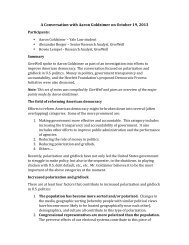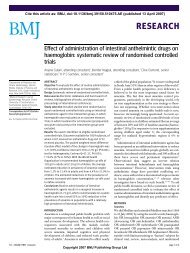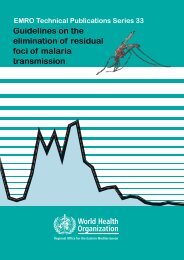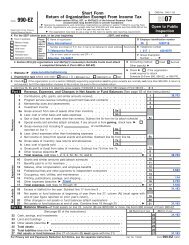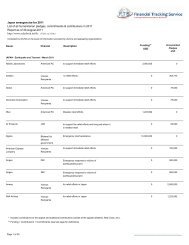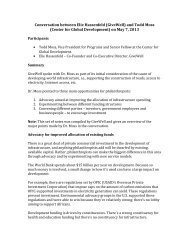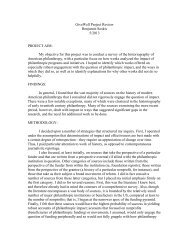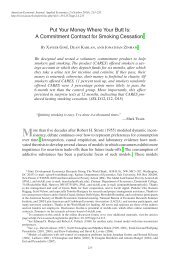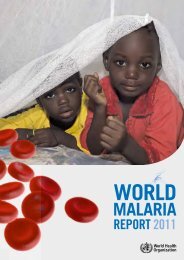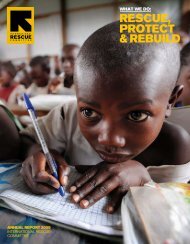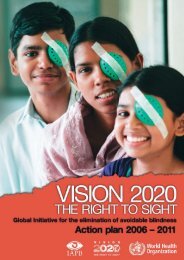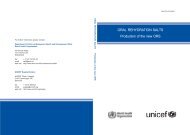Annual Report 2005 - Doctors Without Borders
Annual Report 2005 - Doctors Without Borders
Annual Report 2005 - Doctors Without Borders
Create successful ePaper yourself
Turn your PDF publications into a flip-book with our unique Google optimized e-Paper software.
© Alan Meier<strong>2005</strong>project support19us annual report <strong>2005</strong>LiberiaMedical staff calma young patient atthe MSF-run BensonHospital in thecapital, Monrovia.Hospitals. These facilities provided theonly completely free medical care availableto the capital’s 1.6 million residents. Innorthwestern Lofa county, MSF providedprimary and secondary health careservices, including treatment for malariaand tuberculosis, through its two hospitalsin Foya and Kolahun. MSF-supportedhospitals and clinics treated thousandsof Liberians, including many who arestill internally displaced, in Bong, GrandBassa, Grand Gedeh, Monteserrado, Nimba,and River Cess counties. MSF alsoresponded throughout Liberia to outbreaksof endemic diseases like cholera.MALAWI $1,032,000International staff: 27 National staff: 254Improving HIV/AIDS careIn Malawi, most MSF activities are focusedon treatment and care for those livingwith HIV/AIDS—a population numberingmore than one million adults and children.MSF provides antiretroviral treatmentto 6,900 people through programs inChiradzulu and Thyolo districts.Strengthening Emergency ResponseMOZAMBIQUE $480,000International staff: 35 National staff: 437Treating HIV/AIDSMSF activities in Mozambique focused onHIV/AIDS, where 500 people are infectedeach day. MSF provided antiretroviral treatmentto more than 5,500 people livingwith HIV/AIDS through medical facilities inMaputo, Niassa, and Tete provinces.MYANMAR $150,000International staff: 43 National staff: 731Helping the most vulnerableMSF teams ran malaria projects andmobile clinics in the states of Mon,Kayin, and Rakhine, and in Tanintharyidivision. In Rakhine state in the westernpart of Myanmar, MSF also providedbasic health services to Rakhine Muslims(or Rohingya), a vulnerable and impoverishedgroup whose citizenship isdisputed and movement is restricted.MSF began antiretroviral treatment formore than 550 people living with HIV/AIDSin the capital, Yangon; in Tanintharyidivision; and in the states of Kachin,Shan, and Rakhine.NEPAL $600,000International staff: 10 National staff: 42Assisting civilians trapped by conflictIn the western area of Rukum, MSF ran thedistrict hospital serving 190,000 people.The small hospital is located in an enclaveunder government control near areascontrolled by Maoist forces. In July <strong>2005</strong>,MSF opened a new primary health careproject in the western region of Kalikot.NIGER $11,180,300International staff: 105 National staff: 1,510Saving tens of thousands ofmalnourished childrenDuring <strong>2005</strong>, MSF provided treatment tomore than 63,000 severely acute malnourishedchildren through outpatient andinpatient therapeutic feeding centers in theMaradi, Tahoua, Zinder, Tillaberi, and Diffaregions. The majority of the children weretreated and cured on an outpatient basis. Inthe Maradi, Dakoro, Tessaoua, Keita, Tahoua,and Ouallam areas, MSF teams providedmonthly supplementary food rations to morethan 30,000 families of moderately malnourishedchildren and of children under sixmonths of age.MSF has developed a 120-bed inflatable field hospital with a self-contained heating and water-purificationsystem. The hospital was deployed to Mansehra, Pakistan, following the October 8, <strong>2005</strong>, earthquake. DuringInnovationits first two months of operation, MSF surgeons performed more than 500 surgical interventions.



